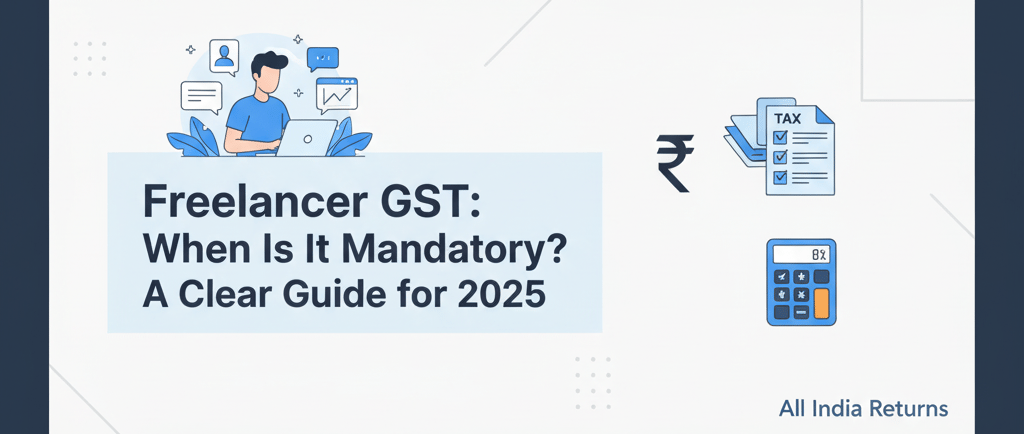Freelancer GST
Freelancer GST: When Is It Mandatory? A Clear Guide for 2025
11/1/20253 min read


As a freelancer in India, one of the most common questions I encounter is: "Do I need to register for GST?"
The answer isn't always straightforward, and confusion around this topic can lead to compliance issues or missed opportunities. Let me break it down for you with real-world scenarios.
📊 The Basic Threshold Rule
GST registration becomes mandatory when your annual turnover exceeds ₹20 lakh in normal states or ₹10 lakh in special category states (including Uttarakhand, North-Eastern states, Jammu & Kashmir, and Himachal Pradesh).
⚠️ Common Misconception Alert!
Many freelancers mistakenly believe the threshold for services is ₹40 lakh—this higher limit applies only to goods, not services. For freelance services, it's ₹20 lakh.
🎯 When GST Registration is MANDATORY
Even if you haven't crossed the turnover threshold, you must register in these scenarios:
1. Exporting Services (Working with Foreign Clients)
If your aggregate annual turnover exceeds ₹20 lakh and you're providing services to overseas clients, GST registration is mandatory—even if 100% of your services are exported.
Example: Priya, a web developer from Delhi, earns ₹26.5 lakh annually from clients in India and abroad. Since her turnover exceeds ₹20 lakh, she must register for GST. For her export services, she can file a Letter of Undertaking (LUT) to avoid paying GST upfront and claim refunds on input taxes.
2. Importing Services from Foreign Providers
Here's a scenario many freelancers miss:
If you're receiving services from a foreign supplier not registered in India (like software subscriptions), you become liable for mandatory registration and must pay IGST under the Reverse Charge Mechanism (RCM), regardless of your turnover.
Example: Rahul, a graphic designer earning ₹7 lakh annually, subscribes to Canva Pro (an Australian company with no GST registration in India). Because he's importing a service for business use, he must register for GST and pay tax under RCM. The good news? He can claim this as Input Tax Credit (ITC).
✅ When Registration Is NOT Mandatory
A special exemption under Notification No. 10/2017 – IGST allows freelancers with turnover below ₹20 lakh to remain unregistered, even when providing interstate services or export services.
Example: Manisha, a freelance accountant from Jaipur, provides services to clients across India and abroad. Her annual turnover is ₹16.5 lakh. She doesn't need to register for GST because she's below the threshold—and this exemption applies even to interstate and export services.
💡 Should You Register Voluntarily?
Even if registration isn't mandatory, voluntary registration can be beneficial:
Benefits of Voluntary Registration:
✅ Claim Input Tax Credit (ITC): Offset GST paid on business expenses like software, equipment, internet, marketing, and travel
✅ Build Credibility: Corporate clients and MNCs often prefer GST-registered vendors
✅ Access to Refunds: When exporting services, you can claim refunds on GST paid for business inputs
✅ Competitive Advantage: Larger organizations require vendors to be GST-compliant for their own filings
Important Note:
Once you register voluntarily, you must comply with all GST regulations—including filing returns, issuing GST-compliant invoices, and maintaining records—even if your turnover stays below ₹20 lakh.
📝 What Are Your Compliance Obligations?
Once registered (mandatorily or voluntarily), you must:
Charge 18% GST on most freelance services (standard rate)
File monthly returns (GSTR-1 and GSTR-3B)
File annual return (GSTR-9)
Issue GST-compliant invoices with GSTIN, SAC code, and all required details
File NIL returns even in months with no income
Export Services?
If your services qualify as "export of services" and payment is in convertible foreign currency, your supply is zero-rated. You can export without paying GST by filing a Letter of Undertaking (LUT) in Form RFD-11 and claim ITC refunds.
⚖️ Key Scenarios: Quick Decision Guide
Your Situation GST Mandatory? Earning ₹15L/year, only Indian clients, intrastate ❌ No Earning ₹15L/year, providing interstate services ❌ No (exempted) Earning ₹25L/year, mix of Indian & foreign clients ✅ Yes Earning ₹8L/year, subscribing to foreign software for business ✅ Yes (RCM) Earning ₹18L/year, want to claim ITC on expenses Optional (beneficial)
🚨 Consequences of Non-Compliance
Failing to register when mandatory can result in penalties up to ₹25,000, late fees of ₹50/day for delayed returns (₹20/day for NIL returns), and 18% interest per annum on unpaid GST.
Additionally, authorities can track your turnover through:
TDS deductions by clients
Bank account transactions (all accounts are Aadhaar and PAN linked)
Payment gateway data
🎯 The Bottom Line
Register for GST if:
Your annual turnover exceeds ₹20 lakh (₹10 lakh in special states)
You're importing services from abroad for business use
You want to claim ITC, build credibility, or work with corporate clients
You're exempt if:
Your turnover is below ₹20 lakh, even with interstate/export services
You're not importing any business services from foreign providers
💬 Final Thoughts
GST compliance might seem daunting, but understanding when registration is mandatory versus optional can save you from penalties and help you make strategic decisions for your freelance business.
When in doubt, consult a tax professional. The cost of expert advice is far less than the cost of non-compliance!
Are you a registered freelancer? What has your GST compliance journey been like? Share your experiences in the comments! 👇
#FreelancerIndia #GSTCompliance #TaxPlanning #FreelanceLife #IndianFreelancers #GSTRegistration #TaxTips #FinancialCompliance #FreelanceBusiness #SelfEmployedent
